Love, Love, Love and “abusive laughter”: Editorial interjection #richardarmitage [spoilers]
Continued from here.
As mentioned there, this is solely my comment. It’s here because I think perception of Act Three is decisively affected by we think of act Two and particularly of its ending. Feel free to skip this if all you want is the straight description. When the Act Three description is finished, I’ll link it to the bottom of this post.
***
When asked to comment on New York theater audiences in an interview with Broadway World, Richard Armitage was quoted as saying, “They probably laugh in more of an abusive way[.]” Several hours later, he tweeted to correct this statement, noting the interviewer had misunderstood “effusive” as “abusive” (politely blaming the miscommunication on his own mumbling); he had wanted to say that New York audiences were more generous with their laughter than (presumably) British ones. I lack sufficient knowledge to comment on that comparison, and I don’t question his correction of his own remarks, but when I first read the comment as printed, I actually thought, yeah, “abusive laughter” is an interesting idea for understanding what makes this play work (or not).
Not least because the script is not obviously funny. When I read it, I recognized it as a potential comedy, but a black, bleak one, or a parody that worked because of its absurdity. Many fans who’ve read the play but have not seen it have expressed that they don’t understand where the laughter comes in, what’s funny about the play, or why people are laughing (one of the purposes for writing the extensive recap — to give people a better idea). Armitage himself made a remark about not realizing it was a comedy right away: “from the inside out, it definitely feels like a domestic drama. I had no concept of how funny the play was until we put it in front of an audience.” (He made a similar comment elsewhere, but I’m not finding it at the moment.)
And audience responses themselves, at least the ones I have observed, were / have been mixed. Although arguably Act One is the funniest section of the play, on occasion, observers have reported low levels of audience response to that portion of the performance. Act Two ends very brutally — as readers have just seen — and on one night when I saw the play, there were fewer than thirty seconds of applause for it. Act Three is chock-full of painful moments as everyone in the play must come to terms with their responsibilities for the past and present — it raises the problem of whether we’re laughing because it hurts too much to cry. If one laughs as this play apparently intends us to, we are often laughing at abuse or abusive situations — or our capacity to laugh at a character whose words might indicate they are truly hurting (most often: Rose, but also Jamie and Kenneth, and depending on how far we are willing to press the point, even Sandra) makes our laughter potentially “abusive.” This isn’t what Armitage wanted to say; indeed, he probably hasn’t thought much about it; but that’s why I didn’t puzzle at all over the designation of laughter as “abusive.”
Both Armitage and Amy Ryan have attributed different levels of laughter to varying audiences (especially by age) and I would never argue with such an obvious assertion. Different people laugh at different things. An audience grows together over the course of an evening, so that the more people who laugh, the more people who eventually end up laughing. Or they don’t: on a dead evening, even audience members who recognize the funny places feel their laughter dampened by their more sober, or more fatigued, fellows. However, beyond the mood or even the age composition of the audience (boomer audiences clearly seem to find Act Three funnier than Xers, by all accounts, and this was also to some extent true for me, but boomers are also capable of finding Act Two horrifying and Xers sometimes have trouble sympathizing with Rose), I think there are also issues with various aspects of the play itself that can make it easier — or harder — to laugh at it, to participate however willingly in “abusive” laughter.
I thought about this quite a bit while I was watching (when is this play funny / when isn’t it? — when does the audience laugh / when doesn’t it? — when do I laugh / when don’t I?), possibly because the first night (11/3) was the weakest performance I witnessed and the second night (11/4) was probably the strongest — so I had a huge contrast to think about right from the start. Here are some possibilities that occurred to me. Moreover, as you will see, I think Act Three is the weakest part of the play — which is a bit of a dramaturgical problem — and matters of whether it’s funny or how it’s funny play important roles in assessing that state of affairs.
In general, the play pokes fun both at the typical problems of each period treated (1960s, 90s, 2010s) and at the typical solutions offered — this is how the play can avoid “taking sides,” as Bartlett intends. In Act One, we’re supposed to laugh both at the (now comfortably past) pricks against which Kenneth and Sandra are kicking, and at the ridiculous ways in which they kick, which simply reformulate a new form of hippie convention avant la lettre. The same goes for Act Two, in which we laugh both at the way that Kenneth and Sandra’s hippie ideals have endangered their family and we are brought to ridicule the way they propose to resolve their troubles. In Act Three, we laugh both at the characters’ situations and at the preposterous ways they want to change them.
Act Two exemplifies the need for the balance between parodied problem and solution more than any other. I mentioned, in discussing it, that audience responses to the jokes varied significantly, from uproarious laughter to straight out gasps of disbelief or anger. The effectiveness of the play as Bartlett intends it relies heavily on the audience finding this act mostly funny (or at least in its general tendency more funny than not). To use a U.S. cultural reference — we need to believe that we’re watching an alternate universe, Bizarro World version of The Brady Bunch, in which we can take no problem too seriously, because if we do, we will cease to laugh. But Kenneth and Sandra are not the Bundys, either — because they cannot embrace their own dysfunction. The proposed resolutions to various issues function as attempts to restore proper order based on the parents’ desires, not abandon it. As spectators, to laugh we have to believe that we are watching a family unit with the typically amusing roles (offended teenager, pesky younger brother, oblivious dad, opinionated mother), but in which all family responses to conflicts (difficult adolescence; marital tension) are presented as zany, high-energy parody that distracts us from their real resolution. Act Two is funny — for instance — both because Sandra and Rose are struggling with a typical mother – daughter conflict and because the standard solution (mum should listen; daughter should calm down) is parodied flamboyantly and with a total lack of self-awareness from both sides, so that the very impossibility of resolution becomes just as funny as the problem was in the first place. The exaggerated escalation of the conflict and the component of parody in the proposed resolution forestall any possible rapprochement between the characters or resolution to the family’s difficulties. Solutions to problems (for example: “if we divorce, everyone will be happier” — an accepted social truth of the 1990s) are presented in a manner so satirical (Sandra’s speech as she doles out slices of birthday cake) that we cannot help but view them as jests, even if the characters themselves maintain they are serious.
In order to maintain the balance necessary to preserve the humor (keeping people laughing, not offering too many chances for us to gasp in more than a sort of nonplussed outrage), the cast must accomplish a number of things. First, the act must go by quickly, so that any processing of the outrageousness of the characters is delayed to the interval. Second, the rhythm of the act must be executed correctly (both Armitage and Ryan have discussed this, the way they can get confused by making the wrong movement, manipulating a prop incorrectly, or slowing anything down too much, disrupting the internal mechanism of the work). The rhythm has to be preserved because of what Armitage last summer called Bartlett’s “dynamic attack” — we can’t be left with too much time to think about why we are laughing or we might develop scruples, particularly in Act Two, where it would be very easy for the audience to take sides with either Kenneth or Rose against Sandra. Third, and for the same reason, all the characters have to remain equally unlikable, particularly when functioning on their axes of conflict (Sandra / Kenneth; Sandra / Rose). Because Sandra has to balance them both out, she is so constantly over the top (self-centered, alcoholic, horrible parent, adulterer), that both Kenneth’s and Rose’s faults must be played very penetratingly, to an extent that doesn’t always seem credible. I think this need for balance explains why the script spends three pages on Kenneth’s infidelity, but devotes relatively less time to Sandra’s affair with Chris, hiding it under Kenneth’s concern with her alcohol consumption — so that reasons to disapprove of Kenneth balance Sandra’s constant status as someone who’s doing something wrong for egotistical reasons. Similarly, the need for balance explains why Rose must be played as such an extreme exemplar of the offended teenager, because we need distraction from Sandra’s simultaneous refusal to pay real attention to her daughter and constant need to compete with her. And crucially, the need for a balance of problem and solution requires that the audience must only suspect, but not know exactly, what Rose does off-stage at the end of Act Two — because if we witnessed it, our capacity to balance both conflict and its parody and find comedy in the ensuing paradox would be seriously challenged.
The end of Act Two is thus both crucial to the effect of the play and highly challenging to execute. It takes a long arc to get there (I found myself asking if the beginning of Act Two couldn’t have been shortened somehow), both to explain the problems and to build up our perception of the characters, and it seems like it might be very easy for our allegiances to become lopsided, sympathizing more with Rose than with anyone else. But if one takes Rose’s side, or takes it too soon, her parents’ dialogue appears so brutal and their attitudes so callous that the play stops being funny. Their excess is only balanced out by hers, and Act Two relies on that counterweight until it’s exploded by Rose’s precipitous action at the end.
So right away there’s a problem if Act Two isn’t perfectly balanced, but I think even if the actors keep everything even and keep us laughing equally at everyone to the end, the ending is hard for the audience to deal with. If we are laughing along — everything seems so constantly ridiculous — then all of a sudden something horrible happens. If it’s not working well — and we are taking sides — we are more aware of the regular signs of an impending trainwreck, but the play still does nothing to prepare us for it. And there’s also no time to recover, as Act Two ends more or less as soon as we discover that Rose has done something disturbing. I found it interesting in talking to fellow fans who saw the play that the ones who had the least problem processing all of it at speed were those who had experienced severe family dysfunction in childhood or adolescence — not because they found Rose’s solution to her problems funny, but because they, of all observers, were most sensitive or alert to the trajectory built into the scene from the point that Kenneth can’t tell Jamie how old Rosie is.
This means that the response to the end of Act Two can be highly variable, but it always, always involves enough of a proportion of shock that the audience is a bit dazed. On one evening I heard silence, and then hesitant, patchy applause that lasted well less than thirty seconds. Even when the audience is still more caught up in the atmosphere of comedy than giving in to the shock at the end, the response is not enthusiastic. If the first interval exudes at atmosphere of good mood, that is not the case for the second interval at all. The play doesn’t give the audience the expected buildup to an event of such gravity; neither does it offer the audience any breathing room to process what has happened. And given the age of the audience, the interval music (from the 80s) doesn’t reproduce the good feeling of the earlier break as most people are not humming along to the music anymore at this point.
As this is now two thousand words and I don’t want to give away the ending by discussing it now, I’ll conclude by saying that what the viewer takes away from Act Two is crucial to where and how much they will laugh in Act Three (and I don’t think this is solely a matter of the age of the audience, as it’s entirely possible that boomers and not just Xers or millennials will be horrified by Kenneth and Sandra’s parenting). And the level — and location — of laughter in Act Three is even more variable that it is in Act Two and I think there’s at least an argument to be made that the ending of Act Two makes it impossible for the play to resolve adequately in Act Three precisely because we often have no idea about what we are supposed to be laughing, or the opportunities we are given seem completely inappropriate or disproportionate. Bartlett would probably say this effect is his intention, not to sew things up neatly, but I think it’s a more serious question (problem?) for the play than that.
On to Act Three, asap. Continues here.
~ by Servetus on December 3, 2016.
Posted in Richard Armitage
Tags: comedy, dramaturgy, Love Love Love, Mike Bartlett
19 Responses to “Love, Love, Love and “abusive laughter”: Editorial interjection #richardarmitage [spoilers]”
Leave a comment Cancel reply
This site uses Akismet to reduce spam. Learn how your comment data is processed.


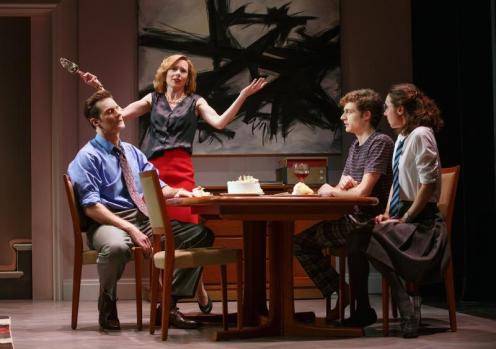
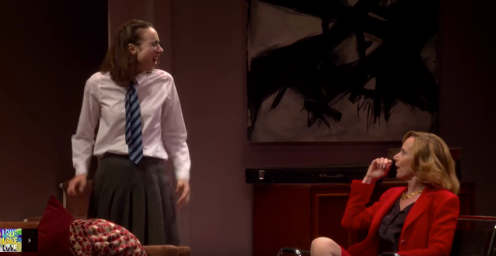
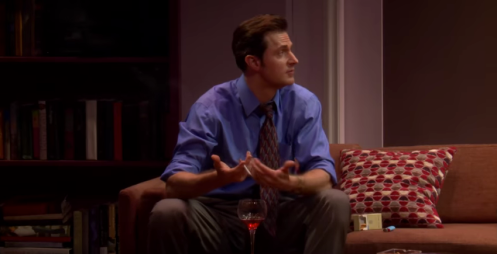
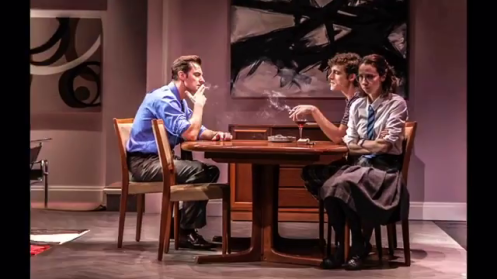
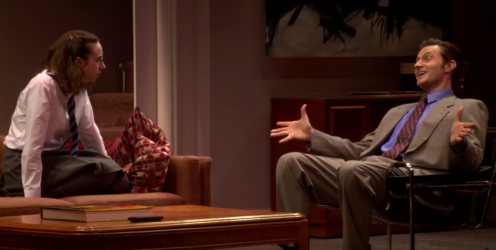



A rather surprising aspect of this play is how it apparently manages to capture an American audience.
Have you ever watched “2.4 children” (the British sitcom from which LLL has at least some of its inspiration)? It was funny in this very British, understated kind of way. An ironic piece about the everyday lives of an average English, lower middle-class family – The two children are secondary characters and victims on the sideline of their parents’ difficulty in coping with the most minute aspects of their lives. It was very funny, and it evoked some sympathy for the characters.
It doesn’t appear as though Sandra or Kenneth would evoke this kind of sympathy. From your account, and that of others, I would image LLL would resemble the works of a Swedish playwright, Lars Norén, whose works were played extensively on Danish stages during the 90s. The themes in LN’s works are dysfunctional families, much is blamed on the mother of the families, and the children are casualties of her dominance and abusive! behaviour.
Now, if you mix those two types of writing/themes, my guess the end-result is similar to LLL.
I truly disliked the two Norén plays, I saw 20 odd years ago; I really liked “2.4 children”. If I would like/dislike LLL, would depend on me as a person now 20 years older, I guess.
LikeLike
No, I haven’t — and I intentionally used the American reference here because I’m trying very hard to avoid having my view of this play influenced too much by Armitage’s ideas of what he thought they were doing, as American critics won’t care too much about that aspect of it. I’m an American and so I’m viewing it through an exclusively American window (albeit mine is maybe not typical) before I start looking at other stuff. (So one more chapter.) One thing I will say is that the fact that the play wears its politics so lightly (and even more lightly for Americans who either don’t notice or don’t get most of the political references) ends up being a problem in Act Three (to be described).
So I can’t make a comparison, at least for now.
LikeLike
I look forward to your description of Act Three. You shouldn’t cloud your perception with new (seemingly unrelated) info, because your accounts are very interesting to read.
LikeLike
Oh, I’ll be happy to clog it up (and revisit the idea of a more traditional analysis) as soon as I note this stuff down. I’m just trying to create the documentation first.
LikeLike
[…] here (editorial […]
LikeLike
Love, Love, Love: Attempt at description, Act 2b [spoilers] #richardarmitage | Me + Richard Armitage said this on December 4, 2016 at 11:10 pm |
[…] Continued from the Act Two performance summary, here; or my editorial comment about Act Two, here. […]
LikeLike
Love, Love, Love: Attempt at description, Act 3 [spoilers] #richardarmitage | Me + Richard Armitage said this on December 5, 2016 at 9:51 am |
I think your notion of balance is an interesting one. I’m not sure that the audience needs to have balanced feelings about the characters, but I think you are right that Rose can’t be too sympathetic or else it is tragic rather than funny. However, even with this concept of balance in mind, I still did not like Zoe Kazan’s over-the-top performance.
I think the pacing of Act Two also was part of what made it work. Something was not working as well in Act Three because it felt more depressing even with the “happy” ending. I think seeing the kids’ lives such a mess in Act Three is worse than seeing things falling apart with Kenneth and Sandra in Act Two.
LikeLike
yeah, I’m not making any claims about the audience needs to feel; it feels how it feels and it is hard not to sympathize with one character or another. There’s at least one person I know who saw this play who immediately sympathized with Rose and never let go of that sympathy and sees the play as a huge failure for that reason. Here, I’m asserting only that the play and Act Two specifically only stay funny as long as a relative balance between the “sides” of the different conflicts prevails, otherwise sympathy with one character turns into frustration with the other one. It struck me in watching the play, however, how invested the audience remained in continuing to laugh. So it’s not just the script of the play or its performance here that seems to want to keep things in balance; the audience may feel an investment in some kind of “fairness” as well.
As I said, I was ambivalent about Zoe Kazan’s performance, but I’m not sure that my reaction lies only in it’s being over the top. She’s no more over the top in Act Two than Sandra is — arguably, she’s less so. In that sense Zoe is a much more familiar figure to me than Sandra. (I’m still thinking about this.)
I think I’d like to talk about Act Three separately, and I’ve started to write that piece. However, I think the hypothesis that one reason Act Three is not as successful is that it starts to become impossible to balance the sides of the conflict effectively (for several reasons that have to do with dramaturgy, but not least because Rose is now an adult and we can no longer “buy” the adolescent behavior in the same way we did earlier.)
LikeLike
True that Sandra’s performances are all over-the-top, and especially in Act Two. But she is funny, and Rose isn’t. The only humor in Rose’s behavior is that teen drama is sort of humorous in fictional characters, at least at first. (Real life teen drama is decidedly not funny!) The scenes Rose are in are otherwise only funny because of the clueless or hurtful things other characters say to her. I guess that is more about the writing than Zoe Kazan’s performance.
LikeLike
Huh. I didn’t find Sandra significantly more funny than Zoe.
LikeLike
Interesting that we experienced Sandra differently. Sandra had funnier lines than Rose, in my opinion, and she delivered them in such a flip way that it made her seem like a person who was completely self-absorbed and unaware of other peoples’ feelings. Somehow it was very entertaining to the audience, while we were simultaneously hating her. Rose on the other hand was a tortured soul, so that was too uncomfortable to be funny.
LikeLike
I was way more irritated by Sandra than by Rose. However, I am in Rose’s generation and also a tortured soul. The other thing was that from my perspective Amy Ryan gave vastly different performances on different nights.
LikeLike
[…] from here (performance description) or here (previous editorial interjection — be aware of commentary on my use the term “abusive […]
LikeLike
#LLLPlay and “abusive laughter,” act 3: Editorial comment #richardarmitage [spoilers] | Me + Richard Armitage said this on December 7, 2016 at 10:21 am |
Interesting that a phrase which was mis-spoken or misunderstood was actually rather an apt description, as I tried to express when I commented that the comedy was an uncomfortable type of comedy. There were definitely times as I was laughing when a little voice inside my head was thinking “this is so wrong/shouldn’t be laughing” and it is a bit of a strange sensation to be cringing and making sympathetic noises at the same time as one is laughing!
LikeLike
I think that is often intended by the play … absolutely. I wondered if it weren’t, in fact, intended to happen more often than actually did happen, e.g., in Act Three. It is a weird feeling.
LikeLike
Are you referring to the “unacknowledged punch line”? I remember just this sense of disbelief that he actually just said what he said right before she said what she just said… like, open-mouthed disbelief (which is in its way, funny!)
LikeLike
For instance. THANK YOU for getting that. If the parody were working correctly, theoretically we should notice that this is hugely funny. So either the parody isn’t working correctly or the suicide / response to the suicide is just too much for us to laugh at.
LikeLike
In a way, it’s the mirror punchline to what I called the Jackie Gleasonquesque joke: it would go:
My father is really horrible!
How horrible is he!
So horrible I tried to kill myself and he forgot all about it! [ba dum dum]
LikeLike
[…] shows provides additional data to answer the questions I articulated about the play earlier: about the dramatic effect of balancing character perspectives and the genre of the play and whether it’s significant. In particular, I was interested in […]
LikeLike
Watching Kathleen Littlefield, or: What genre of play Love, Love, Love is #LLLPlay | Me + Richard Armitage said this on December 22, 2016 at 3:31 am |